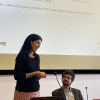The TerraForm project, led by Dr Huw Groucutt, lecturer in Mediterranean prehistory in the Department of Classics and Archaeology, Faculty of Arts, University of Malta, has been awarded a European Research Council (ERC) consolidator grant of almost two million euros. The ERC was established by the European Commission, and is the largest public body funding scientific research in Europe.
TerraForm will explore the origins, evolution, and impacts of agricultural terracing in Malta. Terraces are where stone walls are used to hold soil in place and so allow farming, particularly on sloping land. Terracing is widely regarded as a key aspect of sustainable farming, and has many benefits such as limiting soil erosion and preventing flooding. Malta is one of the most intensively terraced landscapes in the world, meaning that a much larger area of land has been available for agriculture than otherwise would have been the case. There are also hints that terracing could have an early origin in Malta.

Terracing is found in many parts of the world, yet there remains little knowledge on when, why, and where it began. Likewise, there is much to learn on the impacts of terracing. Changes in recent decades mean that in areas such as the Mediterranean vast areas of terracing have been abandoned, and are decaying, which creates risks, from flooding to food security challenges.
Terraform will conduct a detailed multidisciplinary study of terracing, using the Maltese islands as a case study to explore the origin, evolution, and impacts of terracing. It is sometimes stated that terracing began in the Islamic period in Malta, yet it has also been suggested to stretch back into prehistory. By using a variety of cutting edge scientific methods, the project will explore Maltese terracing from its origins to the present.
Malta is famous for its rich history and archaeology, yet focus is generally on spectacular individual sites, such as Neolithic temples. TerraForm aims to take a landscape perspective, exploring how people have modified the landscape through terracing over time, and how this relates to demographic, cultural, and climatic changes. Given that Malta is currently at the frontline of climate change, understanding how things such as droughts and storms are filtered through the terraced landscape is crucial to understand impacts on humans.
TerraForm will bring together researchers from several departments at the University of Malta with collaborations with researchers from the University of Milan, the University of Durham, and elsewhere. The project will use a variety of cutting-edge methods. For instance, ‘optically stimulated luminescence’ dating will allow the timing of terrace construction to be understood, by measuring the length of time since tiny crystals in the soil were buried. From such scientific methods all the way through to interviews and discussions with farmers and others who use the terraced landscape today, TerraForm aims to position Malta at the heart of global studies on terracing.
Dr Huw Groucutt, a Maltese citizen originally from Wales, has been a lecturer at the University of Malta since 2022, before which he was a Max Planck group leader in Germany following several years working as a researcher at the University of Oxford, where he also earlier obtained his PhD. He has written nearly one hundred research publications on long-term human-environment interactions, flowing from archaeological fieldwork in places as varied as Malta, Saudi Arabia, and Senegal. He also teaches diverse aspects of archaeology.
TerraForm will begin in the spring of 2025 so keep a look out for further information and events relating to this exciting project. Dr Groucutt will be working closely with the Project Support Office and Research Support Services Directorate at the University of Malta to carry out TerraForm.
The University of Malta and Xjenza Malta can be contacted for further information and support in relation to European Research Council grants, and further potential applicants are encourage to apply.



